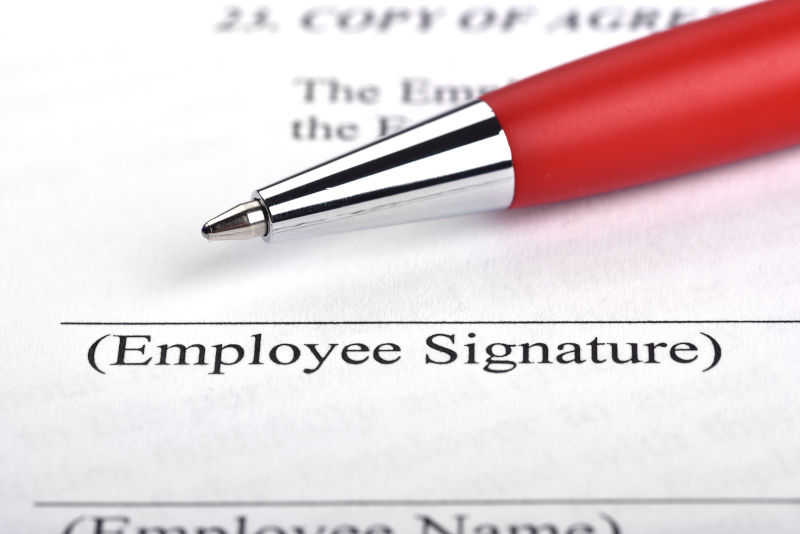**updated April 2018**
Ending a contract of employment can be something of a legal minefield, particularly if you are an employer dismissing one of your employees.
But whether you are an employer or an employee, you may at some point find yourself in negotiations over how a contract should be ended. If so, it is important to be aware of whether these negotiations can be considered ‘protected conversations’.
What is a protected conversation?
A protected conversation is one which is kept ‘off the record’. The concept allows discussions about terminating an employment contract to be kept secret, meaning they cannot be relied upon by either party in any unfair dismissal proceedings. The rule also applies to constructive dismissal claims, which essentially involve an employee resigning (rather than being dismissed or fired) due to a loss of trust in their employer.
If you are an employer, a protected conversation allows you to try to reach an agreement with your employee, without making yourself vulnerable to claims of unfair dismissal.
Either an employer or an employee can request a protected conversation; however, they are most commonly initiated by employers in connection with settlement agreements.
Protected conversations and settlement agreements
Protected conversations can cover any negotiation which aims to agree terms of how an employment relationship will end. In most cases, however, protected conversations will be used in conjunction with a settlement agreement.
A settlement agreement is a document setting out the terms upon which employment will cease. They must be in writing and, once signed by both parties, are legally binding, assuming that the employee has received independent legal advice. Settlement agreements can be seen as a form of dispute resolution; when an employee has a potential claim, or claims, against their employer, a settlement agreement can avoid these from being made. The agreement acts like a contract, whereby the employee agrees not to pursue the claim(s) specified in the agreement in exchange, usually, for payment or some other benefit.
However, where a settlement agreement is not reached, any negotiations will still be considered protected conversations. As such, they remain inadmissible in unfair dismissal proceedings.
When are protected conversations not ‘protected’?
Both employers and employees should be aware of the limits of protected conversations. That way, you can ensure you do not lose the protection if you would benefit from it, or you can identify whether protection has been forfeited by the other party.
To begin with, protected conversations only provide protection in relation to unfair dismissal and constructive dismissal claims. Negotiations will be admissible as evidence for other kinds of claim, such as:
- Breach of contract
- Wrongful dismissal
- Claims made under the Equality Act 2010, e.g.:
- Discrimination
- Victimisation
- Harassment
- Claims where dismissal has occurred for reasons that are automatically unfair, e.g.:
- Whistleblowing
- Being a member of a union
- Asserting a legal right conferred by legislation
In addition, protection may be withdrawn if there has been any ‘improper behaviour’ by either the employer or employee during the negotiations. This is a broad term and it will ultimately be for an Employment Tribunal to decide whether there has been any instance of improper behaviour. The ACAS Code of Practice on Settlement Agreements will often form part of an Employment Tribunal’s decision. The Code gives a number of examples of what could constitute improper behaviour:
- Bullying, harassment, intimidation, or other aggressive behaviour
- Physical assault, threats of physical assault, or other criminal behaviour
- Victimisation
- Discrimination
- Exerting undue pressure on a party. For example, threatening certain consequences if an agreement is not accepted: such as an employer threatening dismissal or an employee threatening to undermine an organisation’s reputation.
If an Employment Tribunal finds that there has been improper behaviour then the protected conversations will no longer be protected. They will then be admissible in unfair dismissal proceedings unless the Employment Tribunal considers it unjust to do so. For example, improper behaviour by one party will not cause a conversation to be admissible when doing so would benefit that same party.
An example case – Lenlyn UK Ltd v Kular
The case of Lenlyn UK Ltd v Kular (2016) UKEAT/0108/16/DM provides a useful demonstration of how protected conversations occur and how they can lose their protected status.
Mr Kular had worked for Lenlyn UK Ltd for a number of years as a financial controller. Lenlyn engaged the services of a contractor, Coin Co., to collect cash from its retail outlets and then to bank it. After several months of this arrangement, it was discovered that Coin Co. owed Lenlyn £1.9 million. The increasing debt had gone unnoticed. When attempts were made to recover the debt, they failed as Coin Co. had already gone into administration.
Following an external investigation, blame was placed on Mr Kular for failing to identify the debt accruing. The investigation report stated that Mr Kular “could be considered negligent” and recommended a disciplinary investigation. However, Lenlyn’s HR manager decided instead to make an offer to Mr Kular through a protected conversation – seeking to end his employment through a settlement agreement. In the protected conversation, Mr Kular was told that the investigation had found him “grossly negligent” and that disciplinary action was being considered against him. He was given a proposed settlement agreement and asked for his response within six days time (the deadline being set by the date the HR manager was due to go on holiday). Mr Kular did not accept the offer and instead resigned, claiming constructive dismissal.
Mr Kular was successful in his claim, and was able to rely upon the discussions in the supposedly ‘protected’ conversation as well. Ordinarily, the protected conversation would not have been admissible. However, the conduct of Lenlyn’s HR manager was considered to be improper behaviour; firstly by saying, falsely, that the investigation had found Mr Kular to be “grossly negligent”; and secondly by only allowing him six days to consider the settlement agreement – the ACAS Code of Practice states that ten days is a reasonable minimum. The six days afforded to Mr Kular was deemed to have put pressure on him. Therefore, the conversation was no longer protected.
How Truth Legal can help
If you find yourself in negotiations over terminating an employment contract, make sure that you seek specialist legal advice. This is the best way to ensure your interests are protected and to prevent unforeseen consequences.
My name is Navya Shekhar and Head of Employment Law at Truth Legal. I have experience of over 10 years in dealing with employment law issues. Our firm has the expertise to fully advise you on any legal matters you may have.
We are more than willing to sit down with you for a free, no-obligation consultation and to discuss any ways in which we can help you. We are often able to conduct claims on a ‘No Win No Fee’ basis.
Our head office is in Harrogate but Truth Legal also has virtual offices in Manchester and London. If you would like to discuss any of the issues raised in this article, please feel free to contact us or get in touch with me directly at navyas@truthlegal.com.
Further Reading
From one of the UK’s most read legal blogs.










